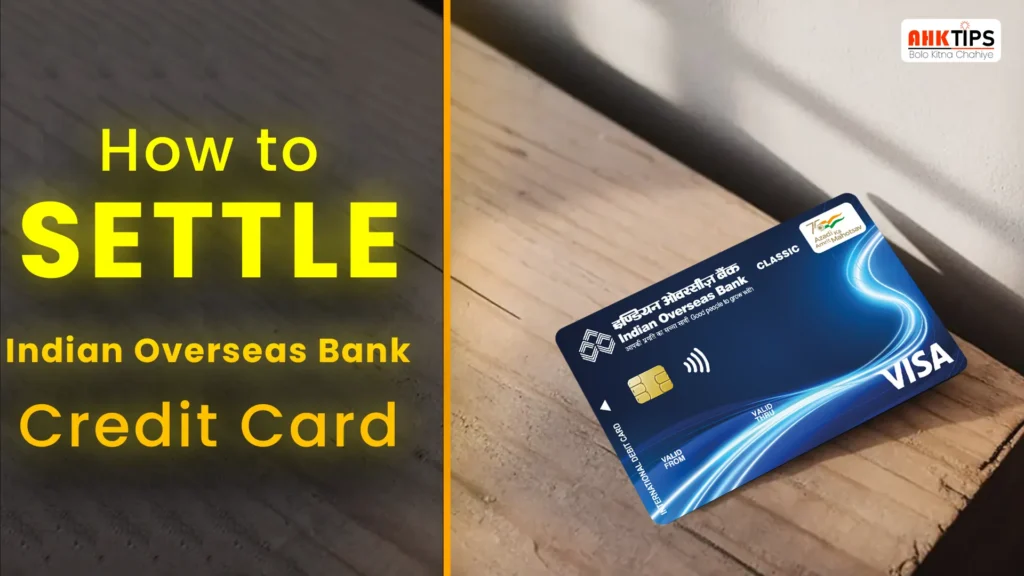Indian Overseas Bank (IOB) is one of India’s leading public sector banks, offering a range of credit cards. While credit cards provide great convenience, the accumulation of unpaid dues can lead to overwhelming financial stress. If you’re struggling to repay your Indian Overseas Bank credit card debt, a credit card settlement might be a viable option to relieve some of that burden.
In this guide, we’ll walk you through the process of settling your IOB credit card, explain what settlement means, and how to approach it efficiently.
What is Credit Card Settlement?
Credit card settlement is a process in which the bank agrees to accept a reduced lump sum payment, less than the full outstanding amount, as full settlement of your dues. It is usually considered a last resort for those who are unable to repay their credit card debts in full. Once settled, the account will be marked as “settled” in your credit report rather than “paid in full,” which may affect your credit score.
When Should You Consider Settling Indian Overseas Bank Credit Card Debt?
You should consider settling your Indian Overseas Bank credit card debt only if repaying the full amount has become unmanageable due to certain financial hardships, such as:
- Loss of employment or a significant reduction in income.
- Medical emergencies or other unavoidable financial burdens.
- If the accumulated interest, late fees, and penalties have made it difficult to keep up with payments.
Before pursuing settlement, it’s essential to explore other alternatives like debt consolidation or converting the debt into EMIs (Equated Monthly Instalments).
Steps to Settle Indian Overseas Bank Credit Card Debt
Step 1: Assess Your Financial Position
Before reaching out to the bank, it’s important to assess your current financial situation. Calculate how much you owe in total and determine how much you can realistically offer as a settlement amount. This will give you a solid understanding of your negotiating position when talking to Indian Overseas Bank.
Step 2: Contact Indian Overseas Bank
Once you have a clear idea of your financial situation, reach out to Indian Overseas Bank’s credit card department. You can:
- Call customer service to speak with the bank’s debt recovery department.
- Email a formal request for a settlement offer, explaining your financial hardship.
- Visit your nearest branch to discuss your situation with a bank representative.
During this communication, express your intention to settle the debt and explain why you are unable to pay the full amount.
Step 3: Negotiate the Settlement Offer
After reviewing your case, Indian Overseas Bank may propose a settlement amount, which is typically 50-75% of your total outstanding dues. Be prepared to negotiate this amount based on what you can afford. It’s important to remain firm, but also realistic during these negotiations.
Be sure to discuss:
- The total settlement amount.
- Any repayment timelines (usually settlements are paid in a lump sum, but sometimes the bank may allow instalments).
- Interest rate or any waiver of late fees that can be adjusted in your favour.
Step 4: Get a Written Agreement
Once the settlement amount is agreed upon, make sure you get the terms in writing. This document should clearly state:
- The settled amount and the payment date.
- That the settlement will close the account and no further dues will be demanded.
This written agreement protects you from future claims or disputes, so it’s vital that you don’t proceed without this documentation.
Step 5: Make Payment and Ensure Documentation
Once the settlement payment has been made, ensure you collect a No-Dues Certificate or Settlement Completion Letter from Indian Overseas Bank. This will act as proof that the debt has been resolved and can be used in case any future issues arise.
Indian Overseas Bank Credit Card Settlement Policy
Indian Overseas Bank’s settlement policy typically offers debt relief to customers who have defaulted on their credit card dues and are facing severe financial stress. Some important points include:
- Eligibility: Generally, you need to be in default for 90 days or more to qualify for settlement.
- Settlement Amount: The bank may settle for 50-75% of the outstanding amount, depending on your financial condition and negotiations.
- Timeframe: The settlement process typically takes around 30-60 days, including the approval of your application and the completion of payment.
Impact of Settlement on Your Credit Score
While settling your credit card debt can provide immediate financial relief, it does have a negative impact on your credit score. Here’s how:
- Settled Status: Once settled, your credit report will show the account as “settled” instead of “paid in full,” which can negatively affect your score.
- Score Drop: Your CIBIL score or credit score may see a significant drop, as the settlement indicates that you did not pay off your debt in full.
- Long-term Impact: The “settled” status can stay on your credit report for up to 7 years, making it harder to qualify for loans or credit cards in the future.
While settlement helps you clear the debt, rebuilding your credit post-settlement is crucial if you want to regain financial flexibility.
Alternatives to Credit Card Settlement
If you want to avoid the long-term consequences of settling your debt, consider the following alternatives:
EMI Conversion
Many banks, including Indian Overseas Bank, offer the option to convert your outstanding credit card dues into EMIs. This allows you to spread out the payment over several months, making it more manageable without harming your credit score.
Debt Consolidation
With debt consolidation, you can take out a personal loan to pay off your credit card dues. This helps you combine multiple debts into one with a lower interest rate, allowing you to repay the amount over time without resorting to settlement.
Balance Transfer
You can transfer your outstanding balance to another credit card with a lower interest rate, helping you manage your payments without the need for settlement. This is especially useful if the majority of your dues consist of interest and late fees.
Conclusion
Settling your Indian Overseas Bank credit card debt can provide immediate financial relief but should only be considered when you are unable to repay the full amount. Make sure to follow the proper steps, from evaluating your financial status to negotiating with the bank and ensuring all agreements are in writing.
Although settlement helps you get rid of the debt, it also affects your credit score, so it’s important to weigh the pros and cons before proceeding. By taking proactive steps to negotiate a fair settlement and manage your finances responsibly afterward, you can ease the financial burden and work towards rebuilding your credit profile.
Frequently Asked Questions (FAQ’s)
Ans: Indian Overseas Bank usually settles for 50-75% of the outstanding dues, depending on the circumstances of your financial hardship.
Ans: The settlement process typically takes around 30-60 days, depending on how quickly an agreement is reached and payment is made.
Ans: Yes, once the settlement is completed and the payment is made, collection calls should stop. Always ensure you have documentation as proof of settlement to avoid future complications.
Ans: Yes, while settling your credit card debt will temporarily impact your credit score, you can rebuild it over time by making timely payments on other debts and using credit responsibly.













